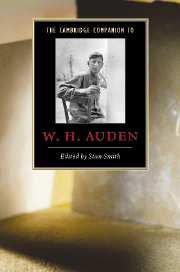Book contents
- Frontmatter
- 1 Introduction
- 2 Auden's life and character
- 3 Auden's England
- 4 Auden in America
- 5 The European Auden
- 6 Auden's travel writings
- 7 Auden's plays and dramatic writings
- 8 Auden's light and serio-comic verse
- 9 Auden's prose
- 10 Auden's English
- 11 Auden and modern theory
- 12 Auden's politics
- 13 Auden, psychology and society
- 14 Auden
- 15 Auden and religion
- 16 Auden's landscapes
- 17 Auden and ecology
- 18 Auden and influence
- 19 Bibliographic essay and review of Auden studies
- Index
11 - Auden and modern theory
Published online by Cambridge University Press: 28 May 2006
- Frontmatter
- 1 Introduction
- 2 Auden's life and character
- 3 Auden's England
- 4 Auden in America
- 5 The European Auden
- 6 Auden's travel writings
- 7 Auden's plays and dramatic writings
- 8 Auden's light and serio-comic verse
- 9 Auden's prose
- 10 Auden's English
- 11 Auden and modern theory
- 12 Auden's politics
- 13 Auden, psychology and society
- 14 Auden
- 15 Auden and religion
- 16 Auden's landscapes
- 17 Auden and ecology
- 18 Auden and influence
- 19 Bibliographic essay and review of Auden studies
- Index
Summary
Auden discusses only two theoretical systems at any length, Freudianism and Marxism, though he does glance at myth criticism. This leaves out two important contemporaries, the rhetorically based formalism known as New Criticism, and the linguistically based formalism which runs from Saussure through Jakobson to structuralism, Lacanian psychology, poststructuralism and deconstruction. In the period since Auden's death, critical trends have put less emphasis on such text-based theories and favoured the greater historical and social orientation of post-Marxism, cultural poetics, reader response, critical discourse theory and multiculturalism. While the descendants of Saussure's linguistic formalism can produce valuable readings, they require the acquisition of a highly technical apparatus and, in the case of Lacan and Derrida, the conquest of perplexing idiolects. To avoid equally perplexing because overly compressed explanations, this group must be relegated to passing references. More accessible are the culturally based approaches of the last three decades. Because these readings derive many of their premises from Freud and Marx, Auden's comments on those authors can furnish a basis for drawing inferences about the later theories. That leaves New Criticism, which Auden seldom addressed and might be set aside, except that it dominated literary studies in America for most of the poet's lifetime. On the related grounds of supporting enquiry into recent critical thought and illuminating the relatively hostile theoretical environment in which Auden worked, this introduction will focus on his three main contemporaries, New Criticism, Freudianism and Marxism.
- Type
- Chapter
- Information
- The Cambridge Companion to W. H. Auden , pp. 137 - 151Publisher: Cambridge University PressPrint publication year: 2005

